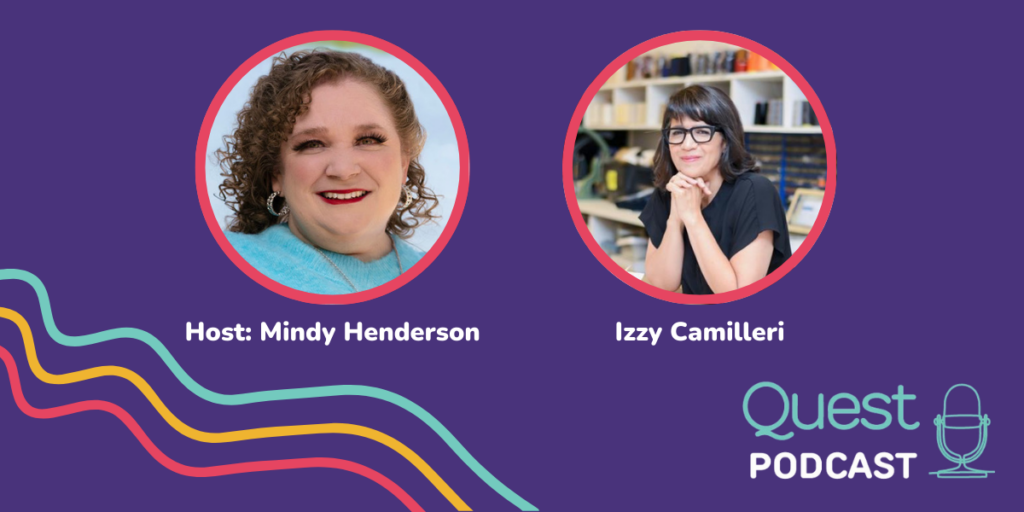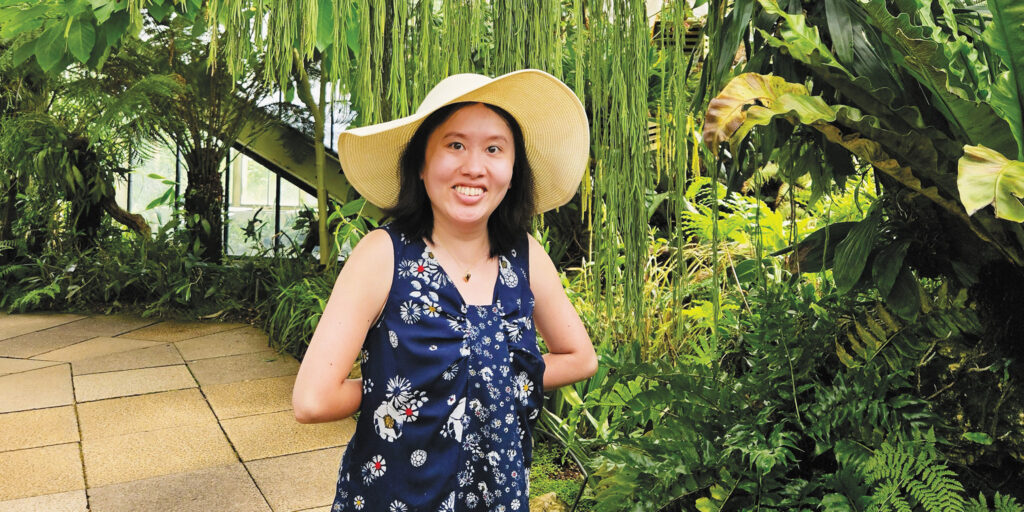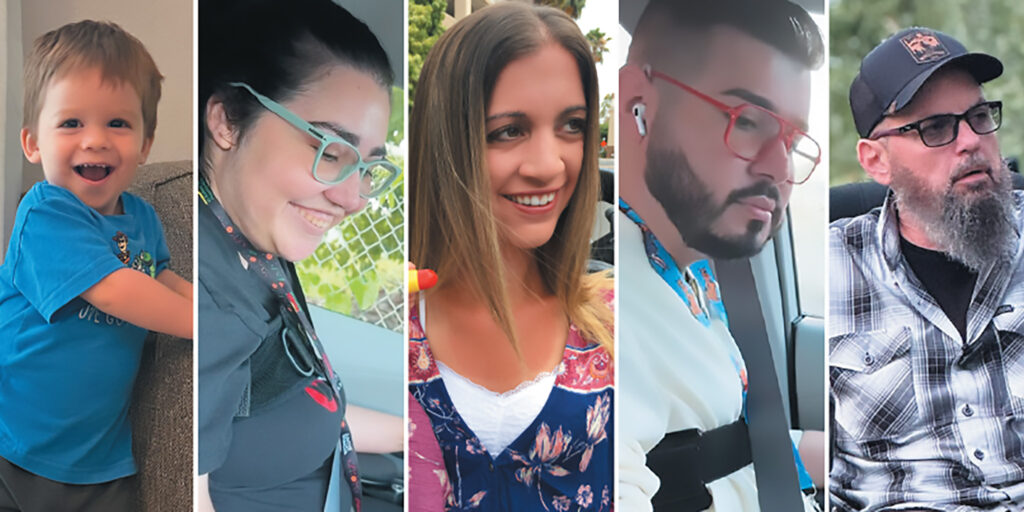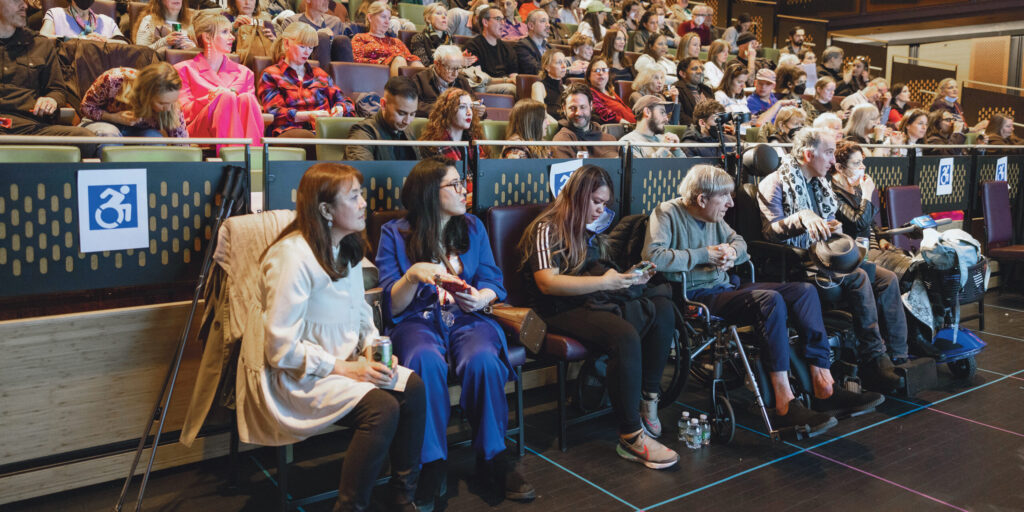
ReelAbilities Co-Founder Talks Representation on the Big Screen
By Maggie Callahan | Monday, February 12, 2024
Since 2007, the ReelAbilities Film Festival has been the world’s largest festival dedicated to films by, about, and for people with disabilities. Founded in New York City by Isaac Zablocki and Anita
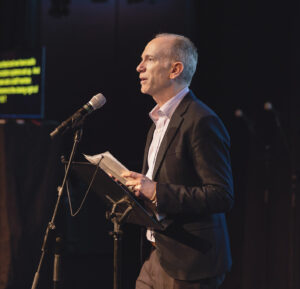
Isaac Zablocki, pictured introducing a film last year, co-founded ReelAbilities in 2007.
Altman, the interactive festival has expanded internationally, with events held in more than 20 cities worldwide. Quest Media spoke with co-founder and director Isaac Zablocki to learn more about the festival, its ambitious accessibility efforts, and the future of disability representation in the entertainment industry.
Q: Can you tell us what makes the ReelAbilities Film Festival unique?
A: Our film selections are really what makes the festival unique, not just because they are films about disability, but because of the types of films about disability we choose. We take a cinematic and artistic approach and prioritize showing great films that aren’t being shown anywhere else. We make sure that all our films are entertaining and of the highest quality, with the best storytelling.
We also believe film is a form of education, so we follow every film with a curated conversation to engage with the audience. I am a big believer in the communal experience of film. Having the community be a part of that conversation and meet the people who made the film humanizes the experience and makes it more relatable.
Q: You’re a graduate of Columbia University’s film school, worked at Miramax Films, and have experience in many different aspects of film, including producing and directing. What inspired you to unite films and disability inclusion?
A: Film and disability have always been a big part of who I am. I have a variety of learning disabilities and am neurodivergent, although I didn’t always admit that and possibly even rejected it. As a student, focusing in school was a problem for me, but when they put a movie on in class, suddenly I could focus. My entire life, I have been deeply impacted by film; it has always been a place I found comfort.
When I started ReelAbilities, I was really creating an extension of who I am. I felt that my job was to start a meaningful film festival that ensures everyone is seen and gives a space for voices not being heard. And there were no voices being heard less, in my opinion, than the disability community’s.
Q: Since the start of ReelAbilities, how has disability inclusion and representation changed in the industry? And what work still needs to be done?
A: It’s changed dramatically. We’ve had some more mainstream movies, such as “Crip Camp” and “Coda,” that opened a lot of doors. With the emphasis on diversity, equity, and inclusion, this concept of authentic portrayals and authentic storytelling, which we’ve promoted for years, is more mainstream. But the playing field is still far from level.
To increase inclusion, Hollywood needs to see that working with a person with a disability doesn’t mean they need to make any compromises in terms of quality and production. You can have inclusion, accessibility, authenticity, and quality. You won’t have to hire a less good actor. You won’t have to hire a less good camera person. You can have it all. I’ve seen it all.
But the hardest part is actually not about changing the industry; it’s about changing the audience. Hollywood’s all about making money, so they’re doing what is profitable. Unfortunately, I think a lot of people still have prejudices about seeing a film that includes disability, so they need to get comfortable with it. I think it’s really about breaking down stereotypes and stigmas that exist, and telling these stories through film is a way to do that. We need to see more people with disabilities on the screen. We need to see more disability inclusion everywhere around us.
Q: You recently launched the ReelAbilities Industry Summit for professionals. Can you tell us more about that?
A: For the last couple of years during the festival, we’ve hosted a summit on accessibility in the film world. This year, we expanded to explore accessibility in the performing arts world. The summit is for industry professionals to discuss best practices to advance accessibility, inclusion, and representation in all aspects of the film and performing arts industries.
The Mayor’s Office of Media and Entertainment in New York City became a huge partner in the summit this past year. The industry has gotten very involved. Because Hollywood is much more interested in disability inclusion these days, we constantly have professionals ask us to connect them to talent or performers. It’s definitely an area that is expanding and where these Summit partnerships are coming to life.
Q: What measures do you take to make the festival accessible?
A: First, we show all of our films with open captions, and we create captions for films that don’t come with them. We involve the films’ directors and creative staff in the captioning and audio description process because it’s part of the artistic process.
We also want to be geographically accessible. The first year, we were in 15 locations in New York City, and we’ve increased to about 40 locations in New York City. Then, when we had to be virtual for the first time during the pandemic, we learned that’s even more accessible. Now we have as much of the virtual component as possible even though we’re back in person and love the in-person experience.
In person, we make all of our spaces as accessible as possible. We go one step beyond universal design and implement what I call individual design. Universal design is there in spaces where everybody is together, but we also save space for the individual’s needs.
As a philosophy, it’s about listening and paying attention to what each person is asking for. For example, we could offer fidget spinners or headsets.
Sometimes, accessibility needs contradict one another. For example, one person may think having the lights on low is problematic, but another thinks it’s helpful. Some people need captioning, and for others, it’s distracting. We can’t adjust the film to everyone’s preference, but we are working to implement more adjustments on our streaming site. We’re always learning and finding new ways to be more accessible.
Q: What advice would you give to aspiring actors, screenwriters, and filmmakers living with disabilities?
A: The advice that I give to all young filmmakers is to show gratitude and be patient. It’s a very frustrating industry to work in, especially when you have a disability. Kindness and gratitude go a long way. Also, authenticity is important — not being afraid to share your story and say your disability out loud when you’re going for the job. Luckily enough — and this wasn’t the case even ten years ago — we live in a world that isn’t going to kick you out for having a disability, make fun of you, or bully you. It’ll even be part of your calling card. People will recognize that you’re telling your story a little bit differently.
Q: When will you feel like your work here is done?
A: That’s something I think about constantly. Because even from the beginning, the goal was to make ReelAbilities obsolete. We’re seeing so much more inclusion, but it’s still an uphill battle. It will be great if someday we no longer have to fight for disability rights and inclusion, but there will always be a need for a place for underrepresented film communities to come together.
One of the most beautiful things that’s come out of ReelAbilities is the community that’s been built. Seeing all these people come together once a year to share their experiences and make friends — it’s a wonderful community.
Maggie Callahan is a writer and editor for Quest Media.
Next Steps and Useful Resources
- In 2024, ReelAbilities is hosting festivals in several US cities, as well as Mexico City and Toronto. Find upcoming festival dates and stream movies at ReelAbilities.org.
- Listen to a Quest Podcast conversation with Bill Crossland, a writer, director, producer, and actor who lives with muscular dystrophy.
- Stay up-to-date on Quest content! Subscribe to Quest Magazine and Newsletter.
Disclaimer: No content on this site should ever be used as a substitute for direct medical advice from your doctor or other qualified clinician.


